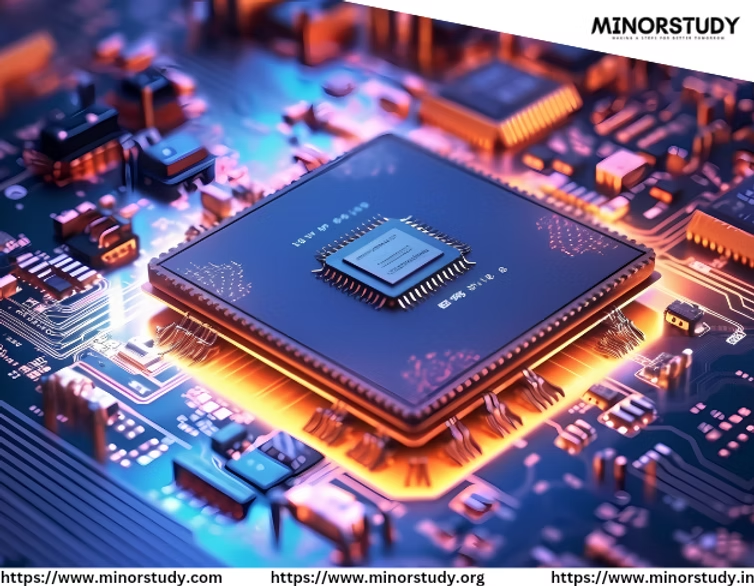Electronics and Communication Engineering (ECE): Overview
Electronics and Communication Engineering (ECE) is a branch of engineering that focuses on the study, design, and development of electronic devices, communication systems, and associated technologies. It combines principles of electronics, telecommunication, and computer systems to address challenges in modern technology.
Key Aspects of Electronics and Communication Engineering
Aspect | Details |
Core Focus | Design and development of electronic circuits, devices, and communication systems. |
Key Topics | Analog and digital communication, embedded systems, VLSI design, robotics, and IoT. |
Applications | Consumer electronics, telecommunications, healthcare devices, aerospace, and automation. |
Objective | To innovate and implement efficient and reliable electronic and communication systems. |
Specializations in ECE
Embedded Systems: Focuses on microcontrollers, microprocessors, and their applications in modern gadgets and systems.
VLSI Design: Involves designing very large-scale integrated circuits for various applications, including processors and memory.
Telecommunications: Covers mobile communication, satellite systems, optical fiber technology, and wireless networks.
Signal Processing: Analyzes and processes signals for applications in imaging, audio, and data communication.
Internet of Things (IoT): Designs smart devices and interconnected systems for automation and real-time monitoring.
Robotics and Automation: Combines electronics with mechanical systems for designing robots and automated solutions.
Nanotechnology: Explores the design of electronic components and devices at the nanoscale.
ECE Curriculum Highlights
Subject | Details |
Basic Electronics | Fundamentals of electronic devices like diodes, transistors, and capacitors. |
Digital Electronics | Design of digital systems using logic gates, flip-flops, and multiplexers. |
Communication Systems | Principles of analog and digital communication, modulation, and demodulation. |
Microprocessors and Microcontrollers | Study of processors like 8085, ARM, and their real-world applications. |
VLSI Design | Designing integrated circuits and understanding fabrication processes. |
Control Systems | Analysis and design of systems to ensure stability and desired performance. |
Signal Processing | Techniques for filtering, sampling, and analyzing signals in various domains. |
Wireless Communication | Focus on cellular networks, Wi-Fi, Bluetooth, and emerging wireless standards. |
Internet of Things (IoT) | Building smart systems and connected devices for various applications. |
Applications of ECE
Sector | Application |
Telecommunication | Design of mobile networks, fiber optics, and satellite communication systems. |
Consumer Electronics | Development of gadgets like smartphones, TVs, and wearable devices. |
Healthcare | Designing medical devices like ECG machines, MRI scanners, and pacemakers. |
Aerospace | Avionics systems, radar communication, and satellite-based navigation. |
Defense | Electronic warfare systems, communication jamming devices, and surveillance systems. |
Automation and Robotics | Embedded systems for industrial automation and robot control. |
IoT and Smart Devices | Development of smart homes, cities, and industrial IoT solutions. |
Future Trends in ECE
5G and Beyond: Deployment of advanced cellular networks for faster and more reliable communication.
Artificial Intelligence (AI): Integration of AI with electronic systems for automation and decision-making.
Quantum Computing: Designing quantum circuits for faster and more secure computing.
Green Electronics: Development of energy-efficient and sustainable electronic devices.
Augmented and Virtual Reality (AR/VR): Enhancing user experiences in gaming, education, and healthcare.
Wearable Electronics: Smartwatches, fitness trackers, and health monitoring devices.
Top Universities for ECE
University | Country |
Massachusetts Institute of Technology (MIT) | USA |
Stanford University | USA |
University of Cambridge | UK |
ETH Zurich | Switzerland |
National University of Singapore | Singapore |
Tsinghua University | China |
University of California, Berkeley | USA |
Career Opportunities in ECE
Role | Responsibilities |
Electronics Engineer | Design and develop electronic devices, circuits, and systems. |
Communication Engineer | Work on telecommunication networks, satellite systems, and wireless technologies. |
VLSI Design Engineer | Create complex integrated circuits and microchips for various applications. |
Embedded Systems Engineer | Develop hardware and software for embedded systems in devices like cars and appliances. |
Signal Processing Engineer | Work on analyzing and processing signals in audio, video, and communication systems. |
IoT Engineer | Design and implement IoT-based solutions for smart devices and applications. |
Robotics Engineer | Build and program robots for industrial, medical, and military purposes. |
Skills Required for ECE
Proficiency in circuit design and simulation software (e.g., MATLAB, Multisim, PSPICE).
Knowledge of programming languages like C, Python, and assembly language.
Understanding of communication protocols (e.g., TCP/IP, Bluetooth, Zigbee).
Strong analytical and problem-solving skills.
Familiarity with microcontroller and microprocessor-based design.
Teamwork and project management abilities for collaborative work environments.
Challenges in ECE
Challenge | Details |
Rapid Technological Changes | Keeping up with the fast-paced advancements in electronics and communication technology. |
Power Efficiency | Designing devices that consume less power while maintaining performance. |
Cost Constraints | Balancing innovation with cost-effective designs. |
Data Security | Ensuring secure communication in wireless and IoT systems. |
Environmental Impact | Reducing electronic waste and designing sustainable technologies. |
FAQs About ECE
What is Electronics and Communication Engineering (ECE)?ECE is the branch of engineering that deals with the design, development, and maintenance of electronic systems and communication networks.
What skills are required for ECE?Skills in circuit design, programming, communication protocols, and software tools like MATLAB and VLSI design tools are essential.
What are the career prospects after ECE?Graduates can work in industries like telecommunications, consumer electronics, aerospace, healthcare, and IoT.
What are the future trends in ECE?Emerging trends include 5G, IoT, AI, quantum computing, and green electronics.
What is the role of an ECE engineer in the IoT domain?ECE engineers design smart devices, develop communication protocols, and integrate hardware and software for IoT systems.
Conclusion
Electronics and Communication Engineering is a dynamic and versatile field that plays a crucial role in shaping modern technology. With applications ranging from consumer electronics to telecommunications and healthcare, ECE offers immense career opportunities. As the demand for innovative and sustainable solutions continues to grow, ECE engineers will remain at the forefront of technological advancements.









«Дела семейные» https://academyds.ru онлайн-академия для родителей, супругов и всех, кто хочет разобраться в семейных вопросах. Психология, право, коммуникации, конфликты, воспитание — просто о важном для жизни.